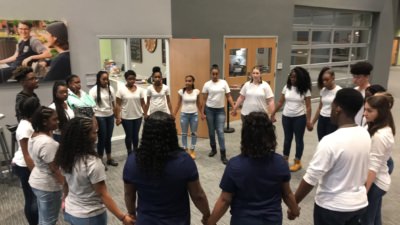In the United States, there are approximately 8,800 educators who are teaching under the protection of Deferred Action for Childhood Arrivals (DACA). In North Carolina there are 264 DACAmented educators. I am one of those 264.
In a nutshell, this means that every two years I must prove to the federal government that I am still worthy of living in the United States. I must provide a trail of paperwork to evidence that I have been in the US continuously. I must prove that I am not a threat to national security or public safety. I must hand over $495 to cover fees every two years.
I begin this process three to four months before my Employment Authorization Document (EAD) expires. I complete Form I-821D, and Form I-765 and Form I-765W, and if there are no delays, I get my fingerprints taken a month or so later. If I am approved, I am guaranteed the ability to legally work for another two years. That had been my previous experience, however with the recent political turmoil, the rules of the game are questionable at best. Uncertainty was my companion as a student in the North Carolina public school system and it remains my companion as a teacher in the NC public school system.
Being a teacher of color and being a DACAmented educator means teaching and learning every day with uncertainty, for both myself and for my students. I read the words of a fellow DACA recipient, “Trying to just sit in class thinking I’m a regular student [is hard], when in the back of my mind all I have are the potential problems that I could have soon.” He is voicing that as a student, it is hard to concentrate in class because of the extra ‘other’ questions that his classmates do not face. I would like to expand on his words, from the perspective of an educator.
I find it increasingly difficult to concentrate on my profession when I have to constantly fight for my livelihood and validate my existence in this country.
At times I will stop midway through my planning, open my computer, and Google, “DACA” again and again as if the repetitive ritual will give the answer I want.
I have the same questions as my peers:
- Is my teaching differentiated and comprehensible for ALL of my students?
- Why is a particular student not coming to school?
- What social commitment am I going to bail on this weekend so I can finish my grading?
- Did I make copies of that test?
- Will I have to carry a gun to school?
- Was my lunch duty/hall duty/meeting today?
- Will I still be teaching next year?
On top of those questions, I also have others that most other teachers do not experience.
- Should I laminate these materials? I might not even get the chance to reuse them next year.
- Are my students feeling this same fear? Maybe that’s why they aren’t coming to school.
- Will DPI decide to take away my licensure because of my temporary working ability? My teaching license has been approved, but I have read that others are unable to obtain theirs.
- How vocal can I be about my situation? Will it bring negative consequences to my school?
- If I struggle with coping with this as their teacher, how are my students dealing with it?
- Will I still be teaching next year? My colleagues ask me about my plans and I want to stay where I am, but that’s not really up to me. My DACA expires September 2018 and while I will be reapplying (so long as the current court rulings hold up), there are no guarantees in my life.
I have thought about questions like this day in and day out, especially since September 2017, and I know I am not the only DACAmented teacher with these concerns. When I am able to overcome the anxiety that comes with this questionable life, I try to answer some of my own uncertainties.
On the question of licensure, I know there are aspiring teachers who are unsure whether they are able to get their licensure and are going through other routes like Teach For America and delaying their debut in the classroom. Why is that?
From what I gather, multiple Educator Preparation Programs do not know whether college students with DACA will make it through the licensure process at DPI. Teach for America has a page dedicated to recruiting DACA recipients but NCDPI has not made it clear. I am here to tell you that it is indeed possible. If you have DACA and have rejected the idea of education because of the uncertainties, I encourage you to go for it. There are people before you who already have.
To bring you more comfort I have reached out to licensure specialists at DPI and they have confirmed that DACA recipients do qualify for receiving the teaching license so long as their EAD is not expired. In a state that is losing future teachers to other professions and other states, why are we letting uncertainty prevent talented and passionate educators from ever getting a start?
On the question of how political I can be as an educator, I have come to the decision that I can not help but be political, whether the issue is immigration, LGBTQ rights, gun control or anything else, to advocate for my students and for my fellow teachers. With this mentality though I have learned the importance of communicating with my team and my school what my plans are so that we can all be prepared. I am lucky to be at a school with a supportive team of administrators and teachers. With their support I have been able to do things such as write articles, speak at rallies and more recently, attend the State of the Union with Representative David Price.
I often think about how much more I could accomplish in the classroom if I did not have to exert the energy to fight for my right to be there. Being a teacher of color means that I face all the uncertainties that come with being a person of color, however, I also come in with the perspectives, skills, and experiences that are needed to teach our ever growing students of color. We will continue to thrive despite the circumstances, and we will lift as we climb.
We are DACAmented teachers. These are our students and these are our schools. We are here to educate. We are here to stay.





